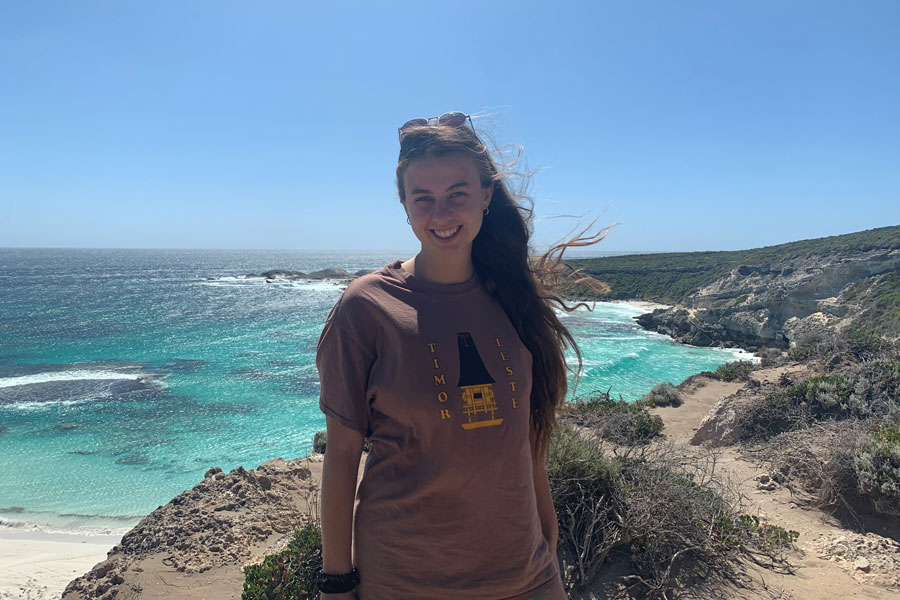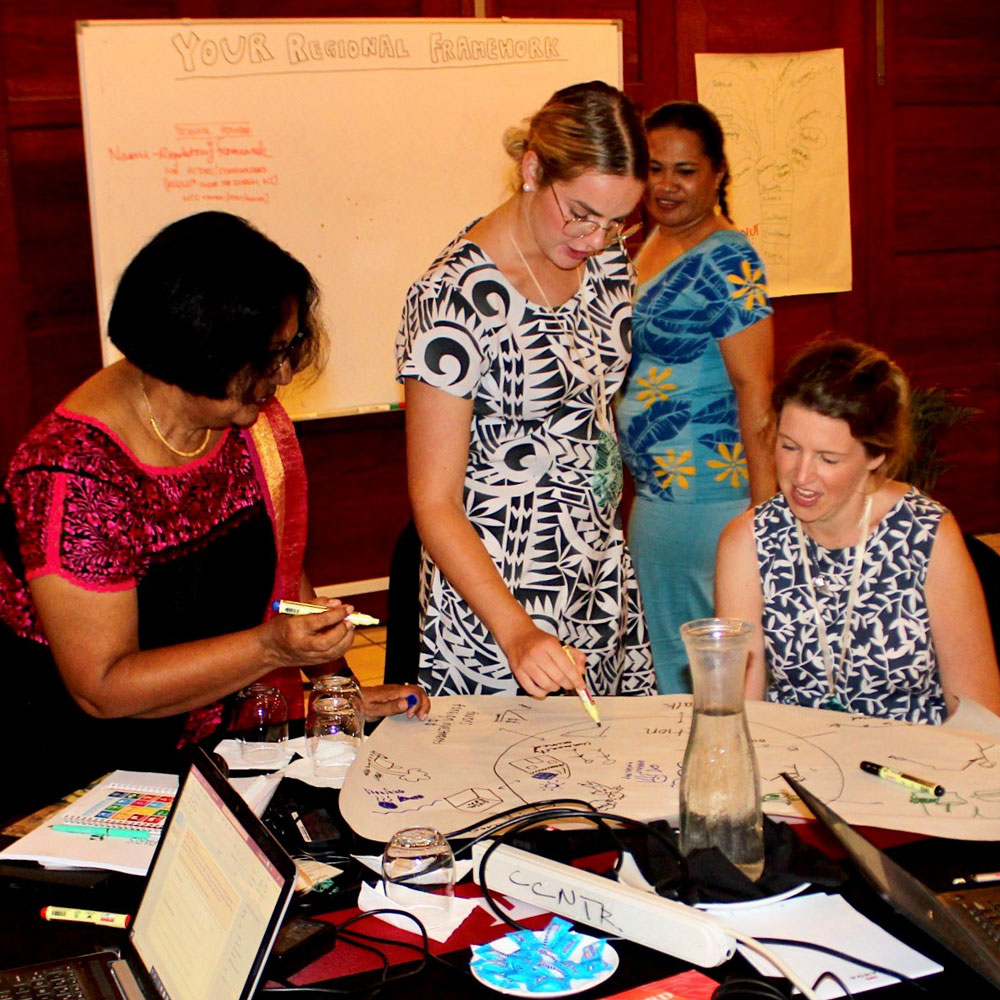COVID-19 hit hard around the world, but its impact is being felt most acutely in communities that are already vulnerable. On World Health Day 2021, New Colombo Plan scholars Shannon Schulz and Soraya McGinley talked to us about their passion for the health and well-being of the peoples of the Indo-Pacific, and how the New Colombo Plan has continued to inspire and shape their academic and career goals in keeping with this year’s #WHD2021 theme: ‘building a fairer and healthier world’.
2020 New Colombo Plan Fellow, Shannon Schulz (Cook Islands)
Credit: George Schulz.
“I am a 2020 New Colombo Plan Scholar, Cook Islands Fellow, and GHD sponsored scholar. I am originally from North America however, I grew up in Perth, Western Australia and I majored in Environmental Science at the University of Melbourne. I am passionate about sustainable business practice in the resource and energy sector.
Receiving the NCP award in November 2019 at Parliament House was one of the biggest moments of my life, and I was filled with so much hope and promise for the year ahead. Unfortunately, as with everyone, 2020 was not the year I had planned for. Instead, I ended up completing my Honours dissertation on Climate Change Adaptation in the Cook Islands remotely from home in Melbourne.
However, this did not mean that my research experience or connection to the NCP waned or was any less valid. I preserved the original inspiration for my NCP program and undertook my honours research in the same area of climate change adaptation, extending my scope so that it would include diasporic Cook Islanders living in Australia and New Zealand. Despite not being able to carry out my research in person as planned, I still connected with over 40 Cook Islanders from the Cook Islands’ capital Rarotonga, the remote outer islands, and even in the same country and city as myself. The experience of completing my honours degree and conducting research virtually taught me that enormous challenges can be overcome through technology. In November 2020, I graduated with first class honours in my Geography Honours degree, and I felt a tremendous sense of accomplishment and anticipation for the opportunities ahead. I am so grateful for the learning experiences that I have been afforded and the connections I have forged during my NCP journey to date.
One of the main takeaways from my Honours research is that climate change is as much of a socio-economic issue as it is a scientific and environmental one. This means that whilst the impacts of climate change are primarily measured and calculated quantitatively, to enact meaningful climate change action requires understanding how climate change will affect people’s livelihoods and beliefs, as this is where behavioural change stems from. I addressed this by studying local perceptions of climate change effects and adaptation pathways in my thesis entitled “Sharing the Future of Climate Change Adaptation: Lessons from the Cook Islands”.
The World Health Day’s theme for this year is ‘building a fairer, healthier world’. I will discuss my thesis findings and draw on a recent NCP facilitated internship experience with the Cross Sector Partnership Initiative (XSPI)to explore the importance of reviewing the success and failure of international aid projects in mitigating the effects of climate change to enable more efficient and effective future responses.
Many Pacific Small Island Developing States (PSIDS) such as the Cook Islands, have come to symbolise the existential threat posed by sea level rise for the rest of the world. The “inevitable and imminent” disappearance of these islands has been positioned by Western science and media to provide an absolute truth about the urgency of climate change for other countries on what lay ahead. Despite and very much in contrast to this superficial stereotype, Cook Islanders still inhabit their homelands and continue to envision meaningful futures for themselves, with livelihoods that are interconnected to land and sea. My research showed that it is important to challenge the assumption that islands are tiny, isolated, and marginalised and therefore “doomed” by climate change. Instead, incorporating country based environmental understandings, context specific research models, appointing local leaders, and using bottom-up frameworks for adaptation programs can enable more efficient and effective future responses.
Having recently completed a review of the global leaders in cross sector partnerships during my XSPI internship, one of the major themes that emerged was the importance of decolonisation and localisation in international development. I drew a lot of parallels between the recommendations that were collected during interviews with expert partnership stakeholders on international development with XSPI, and my own research on climate change adaptation which focused on local perceptions.
One of the main similarities is that working in climate change adaptation and international development requires equitable decision making as a way to further build mutuality, reduce inequity and support capacity development of less established partners. In both research contexts the need to interrogate inherent power structures present in industries and organisations in order to effectively localise was found. Researching perceptions of climate change in the Pacific comes with the responsibility to actively unlearn the narratives of inherent vulnerability that are commonly used to further condemn the future of PSIDS. Similarly follows the need to challenge the global North-South divide that exists in international development contexts where Southern institutions in have reported in some consortia that their voices were not given as much weight as those of their Northern partners. In both contexts often times money and resources ended up being wasted due to lack of mutual respect, effective collaboration and understanding of needs and values. Recognizing these dynamics, prioritizing and elevating local voices are the first steps to building more sustainable and effective climate change adaptation and international development frameworks alike.
The NCP has empowered and connected me to a network of peers and professionals, reaffirmed my purpose, and inspired me to be a change maker. When I am able to commence my NCP program, I hope to intern with several organisations that directly work in climate change adaptation and international development in the Pacific, building on my Honour’s thesis and internship work with XSPI to date. I am confident that the New Colombo Plan will continue to steer me on a career path that will make for a fairer and healthier world.”
2020 New Colombo Plan Scholar, Soraya McGinley (Fiji)
Credit: Pacific Tourism Organisation.
“Human health is inextricably linked with environmental health, and as climate change continues to accelerate environmental decline around the world, it also presents urgent and significant threats to human health.
Drawing on my background in development studies and environmental science, the goal of my New Colombo Plan Program is to gain a deeper understanding of the interactions between climate change and Women’s development in the Pacific, to inform more effective and responsive development assistance.
The increasing frequency and magnitude of extreme weather events such as heatwaves, floods, fires and cyclones expose populations to increased health risks including physical injury, cardiovascular disease, respiratory illness and water-borne diseases. Such events also damage critical health infrastructure and overwhelm health services, exacerbating vulnerabilities. The slightest changes in temperature, rainfall and humidity can also change vector ecology, creating pathways for infectious diseases like cholera, malaria and dengue to spread. Long term environmental challenges such as degrading soil health, drought, desertification, and sea level rise further impact human health in the contexts of food and water insecurity, which compromise sanitation, nutrition and the security of livelihoods.
Importantly, vulnerability to these issues is not evenly or ‘fairly’ spread. Despite contributing the least to climate change, developing nations are most at risk, particularly Pacific Island Nations where the impacts of climate change are most pronounced. Limited access to sufficient socio-economic and health resources undermines resilience, and in much of the developing world livelihoods are closely linked to the natural environment. Within these populations, already vulnerable sub-groups like women, children and people with disabilities are particularly exposed.
Success in addressing this wicked web of issues will ultimately come down to rapid action to lower global emissions and mitigate climate change. To build a fairer, healthier world we need to start with building a healthy planet. In the interim, prioritising the most vulnerable, ensuring adequate access to basic health requirements and facilities, and boosting climate change resilience will be essential.”



